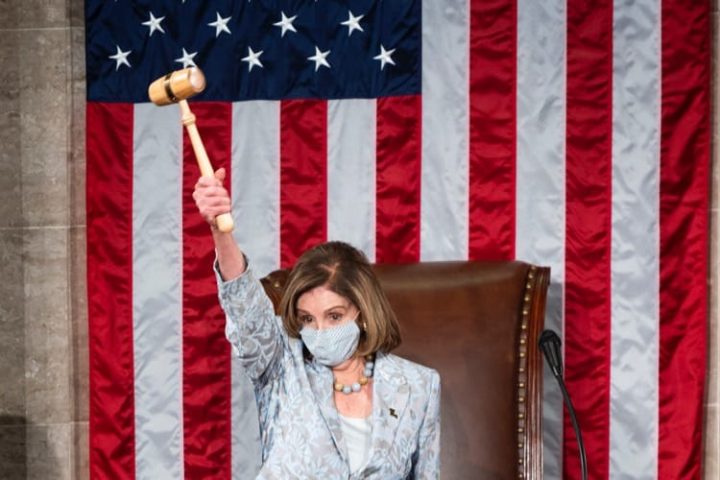
It was a near thing: Nancy Pelosi was reelected as speaker of the house on Sunday in one of the closest elections in recent memory. She won with 216 votes to 209 for House Minority Leader Kevin McCarthy (R-Calif.).
That means that if four more votes had gone against her out of the 425 votes that were cast, McCarthy would be holding the gavel.
Five Democrats defected: Representatives Elissa Slotkin of Michigan, Abigail Spanberger of Virginia, and Mikie Sherrill of New Jersey voted “present,” while two others — Conor Lamb of Pennsylvania and Jared Golden of Maine — voted for a candidate other than Pelosi.
Members of the “squad” — whose number increased by installation of Cori Bush of Missouri in the new congress — protested, but in the end they all voted for Pelosi.
As The New American surmised, if a few more Democrats had failed to make the trip to Washington owing to the COVID virus in order to meet the in-person vote requirement, McCarthy would be speaker.
But Democrat Gwen Moore, a newly minted member of the House from Wisconsin, although still in quarantine for the virus, made the trip to Washington anyway, just to make sure her leader kept the gavel.
As Representative Bruce Westermann (R-Ark.) tweeted, it “looks like Speaker Pelosi’s proxy voting and remote hearing measures are only essential when her leadership position isn’t on the line.”
Now that Pelosi is back within two heartbeats of the presidency, there is a scenario, according to Professor Edward B. Foley of Loyola University, under which she could become president on January 20.
In a remarkably prescient study published last year entitled “Preparing for a Disputed Presidential Election: An Exercise in Election Risk Assessment and Management,” Foley posited a now-familiar scenario — the Electoral College votes are contested and the contest extends past Wednesday, January 6 and remains unresolved on January 20.
Jeff Carlson, reviewing Foley’s paper for The Epoch Times, summarized Foley’s argument:
By claiming the vote-counting process is now “stuck” at the contested states, and the vote count is incomplete, Democrats could … claim “there is no president-elect.”
As there is also no vice president-elect, Democrats could then … claim that “Nancy Pelosi is entitled to serve as acting president for as long as the stalemate remains, by virtue of the Twentieth Amendment.”
The 20th Amendment states: “The Congress may by law provide for the case wherein neither a President-elect nor a Vice President-elect shall have qualified.” The Electoral Count Act fills in the gap: If there is neither a new president nor a new vice president, “then the Speaker of the House of Representatives shall, upon his [or her] resignation as Speaker and as Representative of Congress, act as President.”
Foley poses another scary scenario:
If there were to exist the situation at noon on January 20 of two simultaneous claims to the status of commander-in-chief — one from the … incumbent president claiming to have been declared re-elected by the outgoing vice president, and the other from the Speaker of the House claiming to assume the status of acting president given the House’s declaration that there is no president-elect because the electoral count remains disputed and incomplete — do military officials, including those responsible for control of nuclear weapons, wishing to obey the lawful commander-in-chief know how to decide who is the lawful commander-in-chief?
Related articles:
More Evidence of Voter Fraud as Congress Gears Up for Electoral College Vote Certification
GOP Senators Threaten to Block Electoral College Certification if No Emergency Audit



